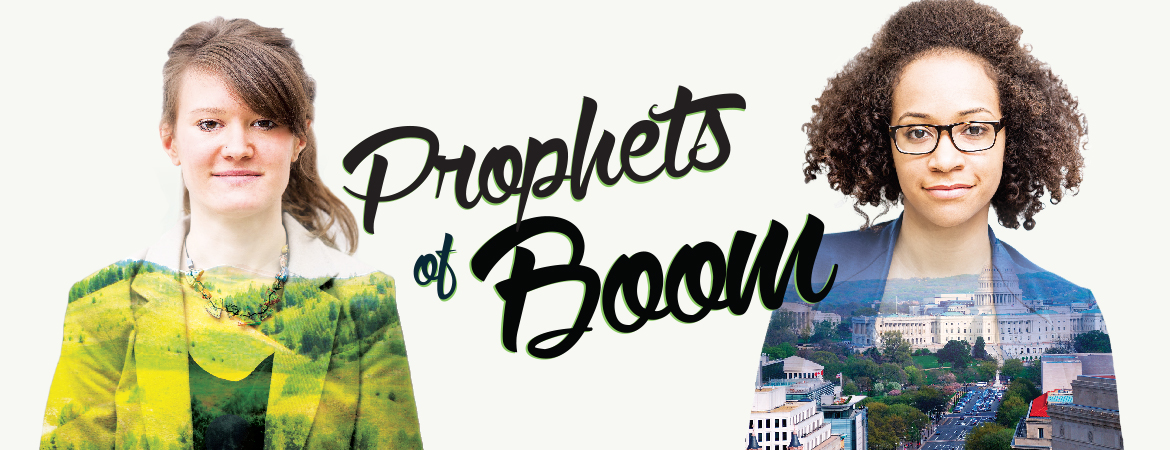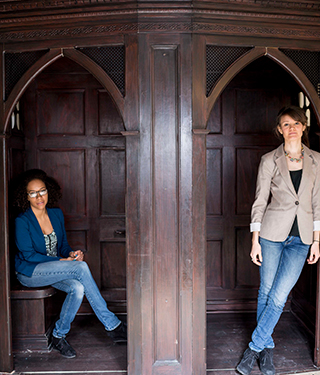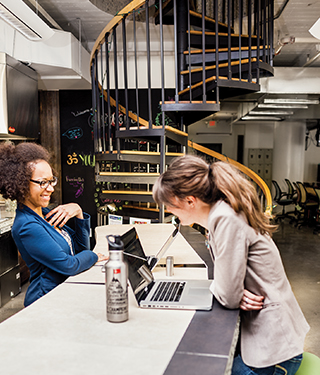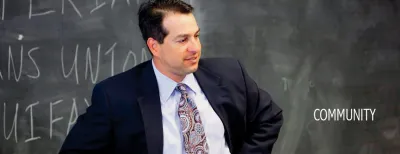
Prophets of Boom
Chutzpah is announcing in college that you’re starting your own company, primarily so you don’t have to look for a job when you graduate. But true mettle is creating a company whose primary purpose is to ensure that every successful business is doing its part to make the world a better place.
Say hello to the Sisters of Holy Audacity: Nicole Koedyker (above, left) and Maria Allison.
They are the co-founders of Forsei Consulting, a benefit corporation (more about that later) that helps small businesses grow by being socially responsible and environmentally friendly. And they are looking at corporate social responsibility in ways that few others are, says Daniel Korschun, an assistant professor of marketing and co-author of the book Leveraging Corporate Responsibility.
“Companies are struggling to come up with a model that integrates green initiatives and social causes into the value chain,” he says. “Maria and Nicole are approaching this like a team from McKinsey Consulting. They could really be on to something.”
“With these two, it was like working with a couple of young professionals who happened to be going to school.”
Nicole Koedyker is your typical rancher’s daughter, if your typical rancher owns a 300-acre cattle ranch in the Rincon Mountains outside Tucson, Ariz. Nicole spent childhood weekends at her family’s Last Chance Ranch, riding horses with her little sister, playing with frogs in the streams and otherwise dillydallying about with cows, chickens, goats and the occasional ostrich. “I’ve always had a deep connection with nature,” she says.
Maria Allison is your typical bi-coastal jet-setter, if your typical frequent flier was raised jointly by a mother in Washington, D.C., and a father in Seattle, Wash. Her continuous exposure to both the laid-back liberalism of the Pacific Northwest and the high-stakes politics of the nation’s capital produced in her a yearning to do good, not just do well.
Nicole arrived at Drexel as an environmental engineering major, which might have worked out if she displayed an affinity that matched her aptitude for physics, calculus, chemistry or mathematics. She did not. Maria planned to arrive at Drexel as a mechanical engineering major on her way to a career in the automotive industry, which might have worked out if the College of Engineering had more confidence in her aptitude for physics, calculus, chemistry or mathematics. It did not.

They never took a class together but they used the campus and city to enflame and refine their passions. Nicole became a four-year president of Drexel’s Sierra Club; she convinced the dining halls to offer more meatless options on Mondays and spearheaded an effort (so far unsuccessful) to ban bottled water on campus. Maria took a year “off” to work with City Year, an AmeriCorps program that partners with high-need public schools to provide full-time targeted student interventions; she tutored seventh graders and directed a summer camp. She also works hard at managing social justice in the residence halls as an RA.
They held co-ops at a major law firm and at Drexel’s Office of Community Partnerships (Maria) and at SEI Investments and at a sustainability consulting company (Nicole). A chance encounter led to Maria’s first foray as a businessperson when a fellow student’s T-shirt company took a Kanye West lyric – “that shit cray” – and turned it into an Internet sensation. Maria launched and managed his line of T-shirts focused on charitable causes. She promoted marriage equality by selling “Love Is Love” shirts at a dozen gay-pride festivals throughout Pennsylvania and eventually spun off to form her own company, Limelight Shirts LLC. Limelight has donated close to $4,000 to charities and nonprofits

It was when Nicole and Maria first worked together on Focus the Nation, a national series of campus-based clean-energy conferences, when they learned that not only can environmental and social causes work together, so can Nicole and Maria.
“Nicole’s so organized,” Maria says. “Me, if I get excited about something, I might do it. When Nicole talks about something, she does it. There’s no disconnect there.”
“Maria’s ambitious and creative but also logical about business strategy. She gets us pumped up. She’s the enthusiastic one,” Nicole says.
They birthed Forsei Consulting one day over coffee at Starbucks. (Forsei is pronounced “foresee,” as in being prescient; the customized spelling represents “consulting for social and environmental impact.”)
With graduation approaching, Nicole knew she needed to “find a job or create one.” Maria was falling out of love with retail and harbored a growing concern that her T-shirt manufacturer was operating in a “less than socially responsible way.” Suddenly, the light bulb (an LED version, for sure) went off: We should create a responsible consulting firm that helps other small businesses become responsible.

Further digging discovered that companies tend to manage green initiatives and social responsibility activities independent of each other. The operations division tries to minimize environmental impact while the marketing department or philanthropic unit awards grants to a variety of non-profits. And consulting advice tends to focus on a standard checklist: Do you recycle? Check. Are you reducing energy consumption? Check. Do your employees and management team come from diverse backgrounds? Check.
Nicole and Maria asked themselves, “How can we help small businesses approach this comprehensively, integrating socially responsible behavior strategically into all facets of their operations?” And that’s when Forsei Consulting was born.
“On a really busy week when I could have rescheduled our meeting, I didn’t, because they were moving things forward quickly,” says Oliver Miller of Immaculate Cleaning Services, one of Forsei’s first clients. The cleaning service is the for-profit subsidiary of Depaul USA, a transitional housing program that assists homeless and formerly incarcerated men with re-entry into employment. Oliver met Nicole and Maria at a conference in University City.
“They walked me through a process I almost definitely wouldn’t have done alone,” he says. “They did all kinds of research on my suppliers and the chemicals we use. The kinds of things that would have stalled me indefinitely.” The results, including a new employee handbook, eco-certified cleaning products and in-house recycling helped the cleaning service attain B Corp status.
“With these two, it was like working with a couple of young professionals who happened to be going to school.”
Forsei helped PurpleTye, a social media marketing company, create the Tye Gives Back Fund; 100 percent of the agency’s after-tax profits help subsidize the marketing costs for their nonprofit clients. Thanks to advice from Nicole and Maria, PurpleTye also hosts free social media workshops for local businesses and hopes to attain B Corp certification by the fall.

“They have a welcoming aura about them,” PurpleTye founder and CEO Montez Smith says about Nicole and Maria. “They just have a look that says, ‘We got you. You can do this.’”
For as long as she can remember, Maria’s worldview has been: “Everyone can win. If they work hard enough, everyone should win.” She graduates this year.
For as long as she can remember, Nicole’s worldview has been: “We need to take better care of this planet.” She graduated in 2013.
And here they are, an economics major (Nicole) and an entrepreneurship major (Maria) doing what they can together to make both of those dreams a reality.

“Neither of them is afraid of launching into unchartered territories,” he says. “They have the courage to jump in.”
Maria’s perspective: “A start-up is tough. You’re up all night doing things. On the other hand, we were already up all night studying, anyway, so what’s the big deal?”
As for Nicole, she applied to graduate school the week after earning her BS. She hopes to be in San Francisco part-time, pursuing dual master’s degrees in business administration and public administration. Her area of study? Sustainability management.
“The real world doesn’t scare me,” she says. “I’ve been living in it since I got to Drexel LeBow.”

Feature photography by Charles Cerrone

